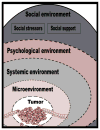The influence of glucocorticoid signaling on tumor progression
- PMID: 23164950
- PMCID: PMC3987853
- DOI: 10.1016/j.bbi.2012.10.022
The influence of glucocorticoid signaling on tumor progression
Abstract
The diagnosis of cancer elicits a broad range of well-characterized stress-related biobehavioral responses. Recent studies also suggest that an individual's neuroendocrine stress response can influence tumor biology. One of the major physiological pathways altered by the response to unrelenting social stressors is the hypothalamic-pituitary-adrenal or HPA axis. Initially following acute stress exposure, an increased glucocorticoid response is observed; eventually, chronic stress exposure can lead to a blunting of the normal diurnal cortisol pattern. Interestingly, recent evidence also links high primary tumor glucocorticoid receptor expression (and associated increased glucocorticoid-mediated gene expression) to more rapid estrogen-independent breast cancer progression. Furthermore, animal models of human breast cancer suggest that glucocorticoids inhibit tumor cell apoptosis. These findings provide a conceptual basis for understanding the molecular mechanisms underlying the influence of the individual's stress response, and specifically glucocorticoid action, on breast cancer and other solid tumor biology. How this increased glucocorticoid signaling might contribute to cancer progression is the subject of this review.
Copyright © 2012 Elsevier Inc. All rights reserved.
Conflict of interest statement
Dr. Conzen has a patent application pending proposing the use of glucocorticoid receptor antagonism in breast cancer. There is no financial conflict of interest.
Figures

References
-
- Adzic M, Djordievic J, Djordievic A, Niciforovic A, Demonacos C, Radojcic M, Krstic-Demonacos M. Acute or chronic stress induce cell compartment-specific phosphorylation of glucocorticoid receptor and alter its transcriptional activity in Wistar rat brain. J Endocrinol. 2009;202:87–97. - PMC - PubMed
-
- Black PH, Garbutt LD. Stress, inflammation and cardiovascular disease. J Psychosom Res. 2002;52:1–23. - PubMed
Publication types
MeSH terms
Substances
Grants and funding
LinkOut - more resources
Full Text Sources
Other Literature Sources
Medical

